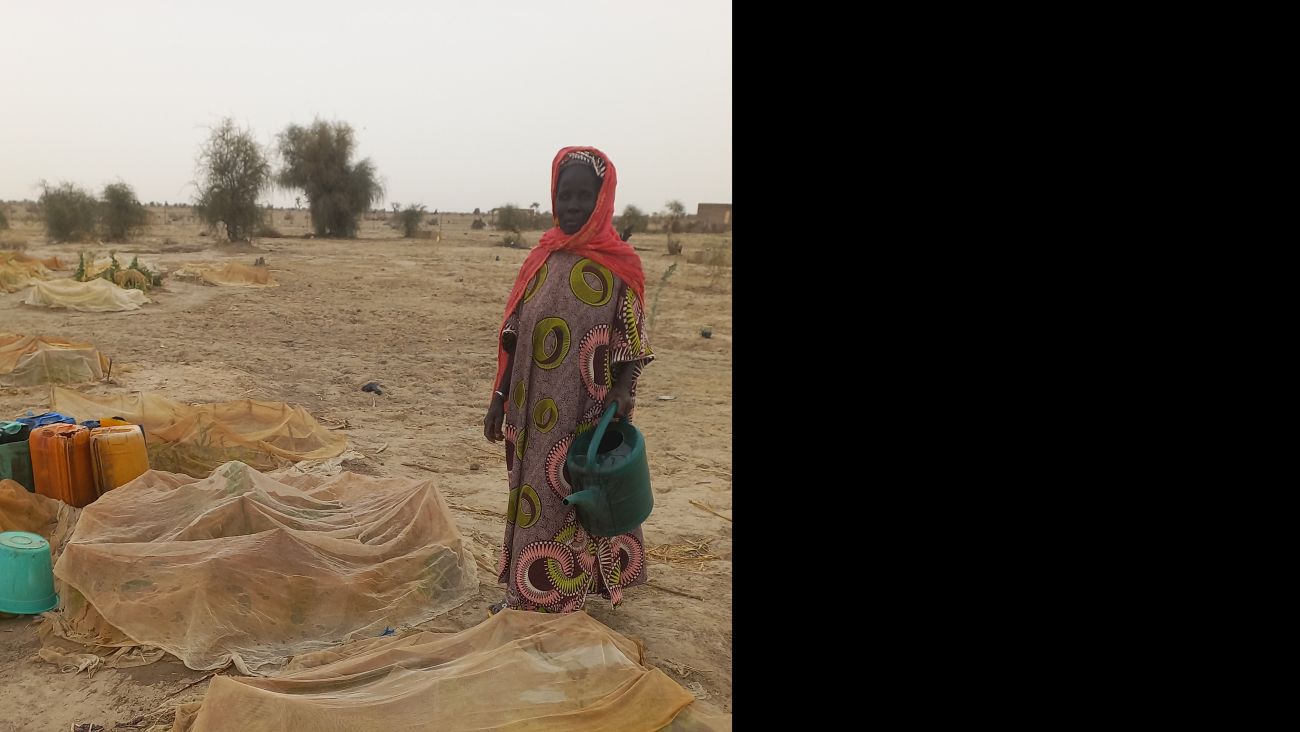share

Fadimata waters her garden. | © HI
As a farmer, Fadimata relies on regular rainfall to provide for her 10-person household in Mali. Following recent changes in the environment, she is struggling to adapt.
“My name is Fadimata Walet, I am 51 years old and I live in Léré, Mali. I am divorced and have a household of 10 people to care for, including 6 girls and 4 boys who are the youngest.
I work as a farmer, which serves as the main source of income for my family. We practice rain-fed agriculture, so we sow our seeds in the wintertime.
The rains used to be abundant, and so were the harvests. I was able to repay the credit I took out to prepare for the agricultural season and I had enough left over to cover 6-8 months of my family's millet needs. Over the years, we have noticed a decrease in the frequency and quantity of rain. The harvests became worse and even our finest seeds produced almost nothing.
There is a pond that used to fill up during the winter period and whose water is used by the women for market gardening. Before, it could last 3 to 4 months without drying up. But these last years, it barely stays one month after the winter. So, we have no choice but to reduce the area that we cultivate.”
“Faced with this situation, I have had to take on  more work. I started cultivating more diverse plant species, hoping to have a quantity of harvest that could cover me for 2 or 3 months. I started to grow vegetables that I sell with the help of my daughter. I also sell firewood and charcoal that I bring from the bush to provide for my family. I offer my services as a cook for ceremonies, and I had to resort to large debts and a loan to revitalize my small business.
more work. I started cultivating more diverse plant species, hoping to have a quantity of harvest that could cover me for 2 or 3 months. I started to grow vegetables that I sell with the help of my daughter. I also sell firewood and charcoal that I bring from the bush to provide for my family. I offer my services as a cook for ceremonies, and I had to resort to large debts and a loan to revitalize my small business.
I didn't need all this before, because the rains were abundant and sustained us. I know many families who go to the refugee camp of M'BERA in Mauritania after the harvest, where they receive food donations from NGOs because their crops are not enough. We hope that things will improve for us, but for the moment we are doing our best with what we have.
Times are hard and we are trying to adapt, but it is very hard to hold on for many of us. I know today that my situation is better than many other families who do not have support.”
“For two years now, I have been receiving financial support from HI, which is enough to cover my family’s food needs,” Fadimata says. “I have a smile on my face because I am relieved from having to borrow, beg or go into debt to feed by family. I have also been able to buy some garden supplies to cultivate my millet field and harvest the vegetables my daughter sells at the market. Without this project, many households would be starving. Today, I am able to meet the needs of my family and am gradually returning to a normal life.”
In Mali, HI works to support vulnerable households and communities like Fadimata’s by reinforcing their resilience to the risks of food and nutrition insecurity in response to climate change.
The organization provides financial support to families to help them afford daily necessities, strengthens malnutrition prevention community groups and implements infant and child dietary advice through community specialists.
The project also supports local initiatives and community projects and reinvigorates spaces for dialogue between local leaders and affected citizens to promote the shared management of natural resources.








HI is an independent and impartial aid organisation working in situations of poverty and exclusion, conflict and disaster. We work alongside people with disabilities and vulnerable populations, taking action and bearing witness in order to respond to their essential needs, improve their living conditions and promote respect for their dignity and fundamental rights.
HI is an independent and impartial aid organisation working in situations of poverty and exclusion, conflict and disaster. We work alongside people with disabilities and vulnerable populations, taking action and bearing witness in order to respond to their essential needs, improve their living conditions and promote respect for their dignity and fundamental rights.